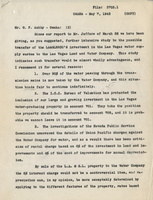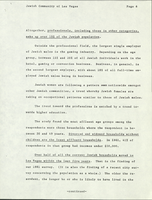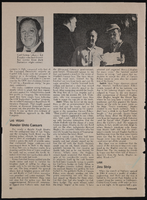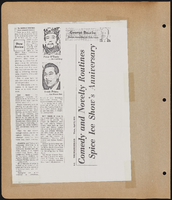Search the Special Collections and Archives Portal
Search Results

Rodrigo Vazquez oral history interview: transcript
Date
Archival Collection
Description
Oral history interview with Rodrigo Vazquez conducted by Nathalie Martinez and Barbara Tabach on May 24, 2021 for the Latinx Voices of Southern Nevada Oral History Project. Rodrigo was raised in a mixed status Mexican family. He was born in Mexico and immigrated to the United States at the age of three, later becoming a citizen when he was in the 8th grade. Rodrigo is currently a graduate student worker for the Latinx Voices Oral History Project and reflects on what he has learned. He also discusses what the past year of the Coronavirus pandemic has been like for him. Subjects discussed include: Latinx and Mexican identities, COVID-19 era, and Latinx Voices Project oral historian.
Text

Letter from W. H. Hulsizer (Omaha) to G. F. Ashby (Omaha), May 7, 1942
Date
Archival Collection
Description
Hulsizer enumerated the many financial and political reasons that the water producing lands controlled by the Los Angeles & Salt Lake Railroad Company should be sold to the Las Vegas Land and Water Company.
Text
Siegfried Haderly oral history interview
Identifier
Abstract
Oral history interview with Siegfried Haderly conducted by Stefani Evans on October 30, 2024 for Reflections: the Las Vegas Asian American and Pacific Islander Oral History Project. In this interview, Haderly recalls his childhood in Manila, Philippines until his parents separated, his mother's move to the United States, and Haderly's move to join her in Las Vegas, Nevada after graduating high school. He describes working first as a dishwasher, and then as a busboy for various hotel/casinos including the Sahara, Desert Inn, and Sands. He then was hired as a bartender and joined the Bartenders Union Local 165 and has been a union member ever since. He shares his experience serving two years in the United States Army during the Vietnam War, and then moving to St. Paul, Minnesota and starting a family. Haderly describes his eventual return to Las Vegas in the 1990s, retiring, and his year-long trips back to the Philippines, and working part-time for family members. At the time of his 2024 interview, Siegfried Haderly was employed as a canvasser for Culinary Workers Union Local 226.
Archival Collection

Transcript of interview with Rabbi Mel Hecht by Barbara Tabach, March 17, 2016
Date
Archival Collection
Description
In this interview, Hecht talks his life experiences leading him to becoming a rabbi, eventually being a spiritual leader in Las Vegas. He discusses his experiences at Ner Tamid as well as the joy of starting Temple Beth Am, with the support of Morris and Lillian Shenker. Hecht shares stories about working with unions and Ralph Engelstad.
In 1939, Rabbi Mel Hecht was born in Detroit, Michigan. At the age of five, his family moved to Miami, Florida where they had a large, extended Jewish family, complete with relatives who were hazzans and mohels. Soon after moving to Florida, his parents bought a hotel in Hialeah, about 10 miles outside of the city, where Hecht spent the remainder of his childhood. Hecht attended the University of Miami where he earned a Ph.D. in Divinity, and subsequently attended the Hebrew University of Jerusalem. In 1971, he became a rabbi upon graduating from seminary in Cincinnati, Ohio. Three years later, Hecht joined the U.S. Army and served as a race relations officer in Germany. After his service, Hecht returned to Florida (Fort Pierce) to lead his own congregation, and in 1980, he moved to Las Vegas and became the congregational rabbi for Congregation Ner Tamid. Two years later, he left Ner Tamid to start a new congregation?Temple Beth Am?which grew swiftly. In 1982, Hecht also married Michelle (?Micki?). The couple have three children: Melissa Hecht, Karin Toti, and Adam Hecht.
Text

Article, The Jewish Community of Las Vegas by Jerry Countess, September 1987
Date
Archival Collection
Description
In this essay, Jerry Countess provides narrative context for a demographic study of the Jewish population in Las Vegas, and addresses the services and community needs revealed by the study and the growing Jewish population.
Text





